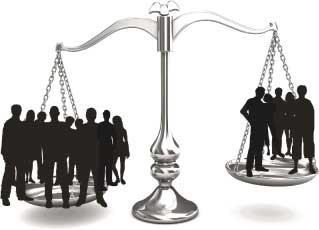
Everybody sometimes disagrees with the decisions of their co-op or condo board. Maybe the choice to rearrange the garbage receptacles out front seems ridiculous, or the ongoing clattering of machinery on the roof is driving the top-floor residents nuts and the board seems determined to let it fix itself. These are the kinds of inevitable complaints that every board has to deal with sooner or later, and most manage to handle such issues with prudence and aplomb.
But what if the board does things that seem to be beyond the pale—perhaps even illegal? Where do boards’ powers end? And how do co-op and condo boards differ in this respect?
Apples and Oranges
To begin with, there are substantial differences between co-op and condo boards. One major difference, according to experts, is that co-op boards generally have a greater power over things like sales and sublets, since the board’s approval is required for applicants.
“Condo boards generally have only a right of first refusal in such matters, which they rarely exercise,” says attorney Stephen W. O’Connell of the Manhattan law firm Hartman & Craven LLP. Co-op boards, he adds, must also deal with underlying building mortgage financing, whereas he says “Condo boards spend more time on assessments, since that is the usual way boards raise money for capital improvements.”
But it’s not that simple. Even between one co-op and another, or one condo and another, the powers given to the board may vary.
Boards have personalities, says Barbara Dershowitz, vice president of corporate development for AKAM, a Manhattan-based property management firm. “Some micro-manage, some partner with management, and some are laissez-faire.” To find out what the powers given to the board are in a particular case, it’s best to look at the building or development’s governing documents.
According to attorney Phyllis Weisberg of Kurzman Karelsen & Frank LLP in Manhattan, “A co-op board’s powers are set forth in the certificate of incorporation, the proprietary lease and the bylaws, as well as New York’s Business Corporation Law. A condominium board’s powers are set forth in the condominium’s declaration and bylaws and New York’s Condominium Act.”
In general, says Weisberg, most boards have the power to develop operating budgets, set maintenance charges in a co-op and common charges in a condo, make day-to-day management decisions, set building policy and enforce the co-op and condominium documents. If specified in the governing documents, some boards also have additional powers, such as the authority to set and impose fines.
The board’s governing documents are where a particular board’s duties and limitations are spelled out. In a co-op, these are the certificate of incorporation, bylaws, proprietary lease and house rules, says Weisberg. In a condo, the governing docs typically include the CC&R, the bylaws and house rules. The covenants, conditions and restrictions (CC&Rs) are governing documents that dictate how the homeowners association operates and what rules the owners—and their tenants and guests—must obey. These documents and rules are legally enforceable by the homeowners association, unless a specific provision conflicts with federal, state or local laws.
“In addition,” she says, “Statutory law [i.e., the New York Business Corporation Law and the Condominium Act) and case law further define and delineate what each board may or may not do.”
New Members
When a new member comes onto the board, says attorney Geoffrey Mazel of Hankin & Mazel PLLC in Manhattan, he or she usually consults with other board members so see how things run. The new member might have gotten their feet wet serving on a committee or been sufficiently interested in co-op or condo affairs to have attended board meetings and seen the basics of how things work.
All in all, the new board member should be made aware of his or her duties as soon as possible. The new member should also take advantage of the board’s attorney’s advice about what the board can and cannot do. Education and advocacy organizations such as the Council of New York Cooperatives & Condominiums (CNYC) and the Federation of New York Housing Cooperatives & Condominiums (FNYHC) and management organizations like the New York Association of Realty Managers (NYARM) also hold seminars to help train new board members, building staff and management personnel. The Cooperator’s annual Co-op & Condo Expo trade show held every spring is also a good place to get helpful information. The 2010 Expo will take place at the New York Hilton on April 27th.
“In the cases of the best-known boards,” says Dershowitz, “the requirements of board service and specific officer positions are written down, updated periodically and handed from the current to the next holder of each position.” In other cases, however, people are elected to boards with no idea of what board service means, and this can lead to problems.
Access to Documents
If a new board member—or indeed any shareholder or unit owner—wants to inspect the building’s governing documents to clarify a point or two, he or she generally has the right to do so, although that person typically must make an appointment. Non-shareholders don’t have the right to look at these documents, but many buildings do give prospective buyers access to them.
Every shareholder and unit owner should be given a copy of the governing documents when they purchase shares in the co-op, or purchase their condo apartment outright, says Weisberg. “These documents are typically included in the offering plan, although the offering plan may not reflect all the amendments,” she adds.
As for minutes of board meetings, they are available to board members. However, says O’Connell, they are not always available to non-board members, since the Business Corporation Law does not give non-board members the right to review the board minutes.
“Some buildings permit shareholder/unit owner review; some do not,” says Weisberg. “Under New York law, a shareholder’s right of inspection is limited to a list of shareholders, minutes of annual shareholder meetings and annual financial statements.”
Still, some buildings or developments whose policy is openness distribute the minutes of their last board meetings, or an abridged form of it, in their newsletters.
Consequences?
So, say that all the board members have examined the rules and regulations, but a resident still thinks the board is doing the wrong thing, willfully ignoring the building’s governing documents. Is such an action punishable by law? Does the board risk lawsuits from residents?
To answer the question, Weisberg says, requires an understanding of what provisions are being ignored. “Is the order of the agenda for the annual meeting set forth in the bylaws? Has the annual meeting been changed to June when the bylaws prescribe April?” This type of violation, she says, are minor and “should not have any real consequence. On the other hand, there are more substantive provisions in these documents, the violation of which may have consequences. For example, has the board exceeded its authority in imposing a fee? Has the board improperly disqualified a voter? Has the board improperly delegated its authority? Has the board failed to make necessary repairs?”
In order for bad faith to be punishable by law, says O’Connell, it must include a criminal act, such as embezzlement or stealing. Misinterpretations of the governing documents made in good faith, though, could still result in a civil remedy for the aggrieved party, such as money damages. If a particular board member violates a civil right or commits a tort (usually damage of property), he or she can have personal liability.
That’s not to say that merely serving on one’s board and making an honest mistake exposes individuals to staggering legal liability. “Most boards have in place omissions and error insurance policies to protect them from claims, including defense,” O’Connell says.
Malice, or Honest Mistake?
Speaking of negligence or bad faith, what’s the difference, and how can boards avoid being involved in either one? Negligence, says Mazel, takes place “when a board does something by mistake and someone is harmed as a result. Bad faith is when the board or a board member does something intentional and causes damages to a third party.”
In order to avoid getting involved in either one, boards should surround themselves with competent professionals such as accountants, attorneys and property managers. The board should consult its general counsel before making any major decisions, and should keep track of what the building’s property manager does.
Board members should also be prudent about discussing sensitive board business outside meetings, including in emails. And they also should not be involved in situations that could be construed as conflicts of interest—for example, giving a contract to repair windows to the brother of one of the other board members without sufficient review.
If a board and its members throw caution to the wind and do things that overstep their powers, its professionals—specifically its managing agent and its general counsel— should try as much as they can to convince them to be reasonable.
While a board is under no obligation to listen to the advice their assembled professionals give them, those attorneys, financial advisors, and consultants should be sure to have it on record—in the minutes of the board meeting, for example—that their suggestions and remarks were ultimately disregarded. And, of course, the shareholder or unit owners can always vote the board members out of office or call for a special election if all else fails.
Some Examples
There have, of course, been examples of boards acting way outside the boundaries of their powers, and the professionals interviewed for this article all gave examples of such.
“A well-known example of board `overreaching, occurred in the 1980s,” says Weisberg, “when the Court of Appeals determined that a co-op board did not have the authority to impose a flip tax on the transfer of apartments. In that case, the co-op was required to return the fees improperly collected.” The case was Fe Bland v. Two Trees Mgt. Co. 66 NY 2nd 566, 498, N.Y.S. 2d 336 (1985).
Weisberg adds that after this decision, the State Legislature amended the Business Corporation Law to permit flip taxes, “provided such fees are described in the original offering plan or have been authorized in the co-op’s proprietary law.”
O’Connell cites a case in which a co-op board denied a sale to an interracial couple: “[A board member] was quoted in the minutes as not wanting to have `their kind’ in the building. The case was a slam dunk against the board, since the smoking gun was found in its minutes/e-mails.”
Dershowitz of AKAM says that in one particular case, “A board president decided to maintain a bank account for the property in his own name. This president believed that this was a good way to keep track of the property’s funds.” Apparently the board member saw nothing amiss in his actions and had no ulterior motive—not that that made what he did okay, of course. “When it was shown to the president that such an action constituted the appearance of malfeasance at the very least, and completely contradicted the manner in which the property was supposed to maintain its funds, the president turned the funds over, and they were deposited into the building’s account.”
And Mazel remembers a case where a co-op tried to raise late fees on maintenance—a fairly routine action to take. However, in this case, the proprietary lease specified a late fee of $25 per month in arrears, and the board tried to raise it to $50 per month. “The board needed shareholder consent to do this, since it involved amending the proprietary lease,” recalls Mazel. “A shareholder picked up on the issue, and the board could not collect the $50 per month late charge.”
Educate Yourself
To prevent abuses of power—intentional and otherwise—your board’s attorney, property manager and accountant should be involved and consulted in the day-to-day business of running your co-op or condo community. In addition, board members can educate and arm themselves against mistakes and miscalculations with the information provided by organizations like the FNYHC, CNYC, and NYARM as well as websites that provide useful information. And of course, board members can also take advantage of resources like The Cooperator or its website at www.cooperator.com.
It’s easy to villainize a board when fees go up, or maintenance isn’t up to par, or there’s overall unrest in a building over some issue or other. Sometimes, boards do let things get out of hand, and sometimes they act improperly, or even illegally. It’s important to remember however, that board members are people—as flawed and fallible as anybody else—and sometimes they make mistakes. That being said, it’s absolutely vital that boards self-monitor their activities and decisions to see to it that they’re carried out properly and transparently.
Raanan Geberer is a freelance writer, reporter, and editor living in New York City.






2 Comments
Leave a Comment